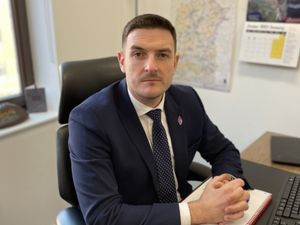Shropshire university teams up with Africa to shape future of farming
Agriculture is the biggest source of employment across the African continent. So, it is no wonder that Shropshire’s Harper Adams University is working so closely with people there.
With the university, juts outside Newport, specialising in education for the agricultural and rural sector, it has tapped into the resources on offer in African countries.
From research projects to the development of new courses, the partnership is helping to shape the farming of the future.
Half a dozen of its projects and partnerships are happening in Kenya. One of these is with the Strathmore Business School in Nairobi, which is running a junior management trainee programme developed by Harper Adams and the AGCO Corporation, a global leader in the design, manufacture and distribution of agricultural equipment.

The AGCO Agribusiness Qualification Programme is the first of its kind in Africa and 20 students have just completed their first weeks of training.
It is a follow-up to last year’s memorandum of understanding between AGCO, Harper Adams University and The Bridge Africa to have more students trained in agribusiness and be better equipped to solve the food security challenges facing Africa.
The university had already worked together on farming projects with AGCO, which runs a ‘Future Farm’ in Zambia. The Future Farm is a fairly new concept that aims to provide agriculture solutions for African farmers, allowing local communities to develop sustainable food production systems.
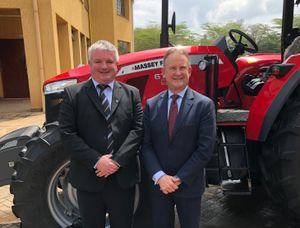
But just over a year ago AGCO bosses began talking to staff at Harper Adams about the potential development of a new agricultural course for Africa. Dr Andy Wilcox, head of the crop and environment sciences department at Harper Adams, said: “We came up with an outline plan for a two-year course based on our foundation degree.” It is recognised as a professional qualification and could go on to become an accredited course in the future.
“We went back and forward a few times. Eventually AGCO agreed to fund it for two years,” Dr Wilcox said. “AGCO wanted to put something back into Africa and they wanted to try and create a situation where they would be able to use local talent in some of their jobs in Africa.
“AGCO has a set of core skills they want in employers and we have mapped those core skills.” He said the average time for a graduate to get a job in Africa is six years. It is hoped the programme will allow these students to move into work more quickly and help boost the agricultural workforce.
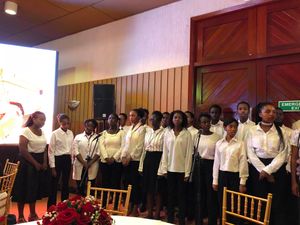
Competition for the programme was tough, with 200 applications having to be whittled down to 20.
Dr Wilcox, who helped to interview the candidates and was in Africa for the programme’s launch, said: “It’s been a really great experience. One of the main jobs they will be able to go into is around product support. They can also move into sales, marketing and tech support jobs.”
Staff, including Dr Wilcox at Harper Adams, will continue to visit Kenya to teach some of the modules. Ed Mashatise, who is lecturer in sub-Saharan and tropical agriculture, will also be visiting to teach there in July. He has been with Harper Adams for nearly a year and also works on other projects between the university and Africa.
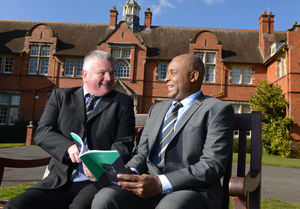
Mr Mashatise is working with Daughter of the Soil Foundation based in the UK and the Mityana Uganda Charity to develop short-course training programmes in agronomy, mechanisation and farm business management in order to empower women smallholder farming communities.
He said: “Farmers of small holdings face huge challenges, and the majority of them are female. Some of these women have been widowed, but for some their husbands are working elsewhere and doing other things.
“In Mityana, Uganda, they’re blessed with two growing seasons a year so if we train them, they can improve their yields and productivity. This will enable them to be able to send their kids to school and do other social activities.
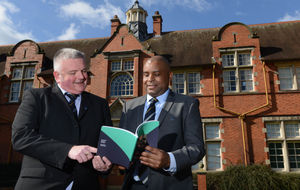
“The project is funded by DOTS and is run in association with Mityana Uganda Charity, which organised the training venue, and helped to identify the 15 women farmers for the pilot.
The topics covered included crop establishment, crop harvesting and storage, introduction to plant nutrition, introduction to soils, crop protection, business management and markets and introduction to agricultural mechanisation.
“Teaching them agronomy is important. They’re spending lots of time in the fields but getting very little back for it. Increasing productivity per hectare is our first priority.
“But alongside this, we also want to promote safety. When they are spraying pesticides and fertilisers, they don’t wear any PPE, like masks. Healthwise they are damaging themselves and have no knowledge of these chemicals. It’s very dangerous.”
Elsewhere, Dr Richard Byrne is working with young agricultural entrepreneurs on a project funded by the Santa Marta Group Foundation called GrowEdo that aims to construct a solar dryer from local materials in Nigeria.
A small number of African students are also studying courses at Harper Adams and Dr George Njenga, dean of Strathmore University Business School, plans to visit the university for a symposium on technology’s role in feeding the Commonwealth.

